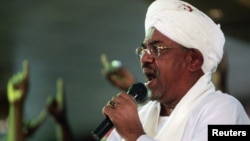Sudan's President Omar al-Bashir has announced radical spending cuts, amid signs of severe financial stress for his government.
Speaking to lawmakers Monday, Bashir said his cabinet and all levels of government will have to accept budget cuts of 45 to 50 percent.
"That includes the legislative assembly, federal ministries, ministers, experts, and contractors [who] work under the umbrella of the presidency, and the council of ministers, in over 100 places," he said. "The same measures are applied on state and local governments."
He also said the government would gradually end fuel subsidies for the public.
Sudan has faced increasing financial problems since South Sudan shut down oil production in January, after refusing to pay high fees to use northern pipelines.
The loss of revenue has depleted Sudan's foreign currency reserves. Last week, Sudan's finance minister said the country is bankrupt, and warned that inflation is rising rapidly.
The south took over the bulk of Sudan's oil fields when it became independent nearly a year ago, but depends on Khartoum's facilities to send its oil abroad.
Clashes along their shared border have raised fears of all-out war between the two Sudans, further hurting both countries' economies.
Sudan has already been fighting rebels in its Darfur region for nine years.
President Bashir is wanted by the International Criminal Court for alleged war crimes, crimes against humanity, and genocide against civilians in Darfur.
Speaking to lawmakers Monday, Bashir said his cabinet and all levels of government will have to accept budget cuts of 45 to 50 percent.
"That includes the legislative assembly, federal ministries, ministers, experts, and contractors [who] work under the umbrella of the presidency, and the council of ministers, in over 100 places," he said. "The same measures are applied on state and local governments."
He also said the government would gradually end fuel subsidies for the public.
Sudan has faced increasing financial problems since South Sudan shut down oil production in January, after refusing to pay high fees to use northern pipelines.
The loss of revenue has depleted Sudan's foreign currency reserves. Last week, Sudan's finance minister said the country is bankrupt, and warned that inflation is rising rapidly.
The south took over the bulk of Sudan's oil fields when it became independent nearly a year ago, but depends on Khartoum's facilities to send its oil abroad.
Clashes along their shared border have raised fears of all-out war between the two Sudans, further hurting both countries' economies.
Sudan has already been fighting rebels in its Darfur region for nine years.
President Bashir is wanted by the International Criminal Court for alleged war crimes, crimes against humanity, and genocide against civilians in Darfur.





